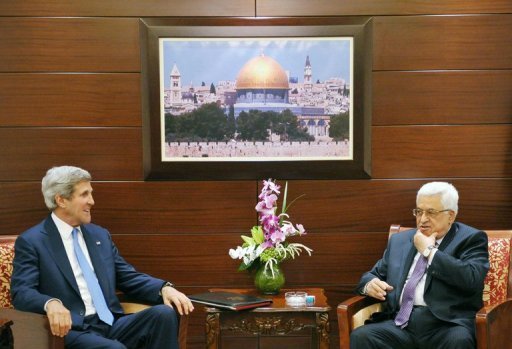Israeli and Palestinian officials resume direct peace talks Monday after a three-year hiatus, amid hopes US Secretary of State John Kerry’s quiet diplomacy may this time carry some chance of success.
In a landmark agreement, the chief negotiators from both sides will meet face-to-face to draw up a plan for how the talks will proceed, State Department spokeswoman Jen Psaki said.
The dream of a Middle East peace deal has for decades been a chimera chased by US presidents but has stalled since September 2010, shot down by deep divisions and distrust between the two sides.
After months of dogged diplomacy, Kerry earlier this month, on his sixth trip to the region, wrested from both sides an accord setting out “the basis for resuming direct final status negotiations,” Psaki said in a statement Sunday.
Israeli Justice Minister and chief negotiator Tzipi Livni, as well as legal aide Yitzhak Molcho, will first meet late Monday with Palestinian chief negotiator Saeb Erakat and senior official Mohammad Shtayyeh for an Iftar dinner hosted by Kerry to break the fast observed during the Muslim holy month of Ramadan.
The announcement came shortly after Israel announced plans to release 104 Palestinian prisoners — some of them convicted for attacks on Israelis.
Israeli Prime Minister Benjamin Netanyahu’s cabinet met Sunday as he battled to convince some of his coalition partners to accept the prisoner release and to approve the resumption of talks.
Israeli public radio reported the 22-member cabinet had only approved the release by a vote of 13 in favor, seven against and two abstentions.
The chief Palestinian negotiator welcomed the Israeli vote. “We consider this an important step and hope to be able to seize the opportunity provided by the American administration’s efforts,” Erakat told AFP.
While the names of the prisoners have yet to be published or even revealed to ministers, they reportedly include militants convicted of killing Israeli women and children or of killing Palestinians suspected of collaborating with Israel.
The last round of direct peace talks between Israel and the Palestinians, shepherded by US President Barack Obama, broke down in 2010 over the issue of Israeli settlements in the West Bank and east Jerusalem.
And Israel and the Palestinians remain deeply divided over so called “final status issues” — including the fate of Jerusalem claimed by both as a capital, the right of return for Palestinian refugees and the exact borders of a future Palestinian state.
Already the planned prisoner releases — long a demand by Palestinian president Mahmud Abbas — have stirred protests from Israeli victims’ families, settlers and Netanyahu’s hardline coalition partners.
Likud Deputy Defense Minister Danny Danon urged ministers to vote against the release, branding it “a diplomatic mistake, a moral mistake.”
It is believed a timeline has been placed on the new talks, although the exact length is unknown, with reports varying between six months to a year.
Ahead of the talks, the Israeli cabinet has also approved a bill that would require a referendum for a peace treaty in some circumstances.
If adopted, the bill would oblige the Israeli government to poll its citizens in cases where territory over which Israel claims sovereignty is ceded in a peace agreement or by a cabinet decision.
So such a vote would not apply to an Israeli withdrawal from the rest of the West Bank, but would apply to changes in east Jerusalem which Israel occupied in 1967 and annexed, in a move never recognized by the international community.
Abbas has also reportedly said he would put any future peace deal to a Palestinian referendum as well.

COMMENTS
Please let us know if you're having issues with commenting.